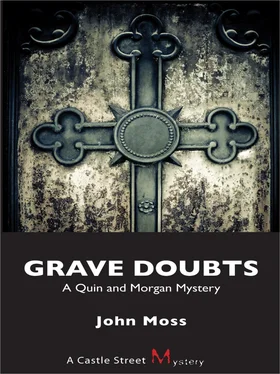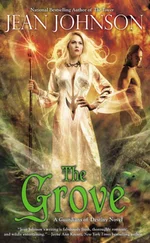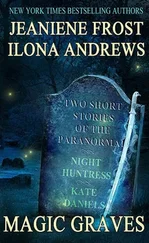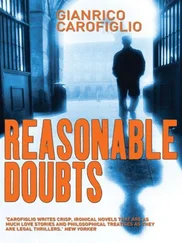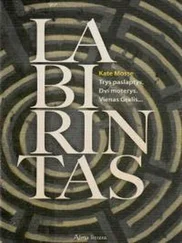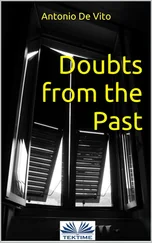John Moss - Grave doubts
Здесь есть возможность читать онлайн «John Moss - Grave doubts» весь текст электронной книги совершенно бесплатно (целиком полную версию без сокращений). В некоторых случаях можно слушать аудио, скачать через торрент в формате fb2 и присутствует краткое содержание. Жанр: Криминальный детектив, на английском языке. Описание произведения, (предисловие) а так же отзывы посетителей доступны на портале библиотеки ЛибКат.
- Название:Grave doubts
- Автор:
- Жанр:
- Год:неизвестен
- ISBN:нет данных
- Рейтинг книги:4 / 5. Голосов: 1
-
Избранное:Добавить в избранное
- Отзывы:
-
Ваша оценка:
- 80
- 1
- 2
- 3
- 4
- 5
Grave doubts: краткое содержание, описание и аннотация
Предлагаем к чтению аннотацию, описание, краткое содержание или предисловие (зависит от того, что написал сам автор книги «Grave doubts»). Если вы не нашли необходимую информацию о книге — напишите в комментариях, мы постараемся отыскать её.
Grave doubts — читать онлайн бесплатно полную книгу (весь текст) целиком
Ниже представлен текст книги, разбитый по страницам. Система сохранения места последней прочитанной страницы, позволяет с удобством читать онлайн бесплатно книгу «Grave doubts», без необходимости каждый раз заново искать на чём Вы остановились. Поставьте закладку, и сможете в любой момент перейти на страницу, на которой закончили чтение.
Интервал:
Закладка:
Catching sight of himself reflected amid the images shunting through his mind, he relaxed and briefly attended to the mundane necessities of brushing his teeth and washing. He lifted his pyjamas, black moose strolling on a red background, from a hook on the back of the bathroom door and walked stark naked up to his bedroom where he stood, shivering, lost again in contemplation.
He was so tired, nothing made sense, and after becoming thoroughly chilled he put on his pyjamas and climbed into bed. He curled around himself and breathed deeply, lifting the covers for a moment to let a defining burst of cold air penetrate his cocoon, then he sealed them snugly around his shoulders and almost immediately drifted into a deep slumber.
Morgan awakened to the insistent ring of the telephone. He picked up the receiver on the night table but there was only a dial tone. Maybe he had dreamed it was ringing. Light rising from the window downstairs indicated it was mid-morning, but he was not interested in getting up.
He rolled over on his back without looking at his watch or the alarm clock on the dresser and drew the covers close. He had tried an eider-down duvet someone once gave him, but preferred the weight of thick wool blankets, which seemed to modulate their proffered warmth according to his needs, rather than smothering him with the indifference of feathers. Snug, breathing the cool air of the room, he tried to reconstruct his last dream.
Inevitably, it evaded coherence. There were images of wizened corpses entwined as intimately as their clothing allowed, of skulls with their features contorted into the tight grimace of mockery at the fears of the living, of plaster and bronze torsos and severed limbs, of flesh mounded and shapeless, waiting to be formed into bodies. There was a diorama contrived at Hogg’s Hollow with meticulous care to convey mystery, and a confusion of intent and response. There were intimations of genius, and no question about murder. Heathcliff, Rodin, romantic love, death…
“What are you thinking about, David? Where is this going?”
Corpses beheaded, enclosed in an airless crypt, the death of romance. He said nothing.
“Turning death into metaphor isn’t murder, David. Perhaps murder preceded, but the display is romantic. Don’t you see? Get rid of the heads, let the bodies embrace. It is passion over reason, David, as it should be.”
His wife was leaning across a kitchen table, challenging him. He had not seen her in a dozen years and they had been divorced even longer. He knew he was in a dream. He felt defensive. He roused himself, trying to wake up.
“Stay here, my darling. Don’t leave me. We can work this out together.”
He stifled an answer, refusing to give her presence validity.
“Don’t you love me? Do you love me?”
He had no answer.
“Talk to me, David. Tell me about loving forever. Show me the perfect kiss. How delightful, David — an eternal instant. How abysmally sad.”
He tried to find her eyes, but they were empty sockets. Her lips were tightly clenched but the voice was clear and unnervingly familiar.
“Two heads, David, kissing forever. It’s all in the head. Reason over passion, don’t you see? Drop two heads down a chute, no telling what they’ll be up to, perpetually falling. Didn’t you ever wonder about heads in the guillotine basket? Between decapitation and the end of consciousness, did they exchange glances? What secrets and jokes passed among them, David?
“Was that our problem, David? Minds and bodies didn’t come together? We couldn’t tell secrets from jokes!”
Morgan spoke at last and his voice was like thunder.
“I do not love you, Lucy…”
The sound of his words resounding through the loft awakened him. He rolled over and stared at the ceiling, inconsolably lonely.
Thoughts gathered of the ring and the crucifix and gradually filled the emptiness. Did the conjunction of such potent talismans lead to death, or was death merely the prelude to staging the scene in anticipation of eventual discovery? What variables were manipulated for our benefit, he wondered, and what for the author’s own? And what were the gratuitous contributions of history, of time passing? He could have no way of knowing our ways of seeing, so far in the future.
Morgan tried to reconstruct the character of the killer. That seemed the key to understanding his crime. It would have taken considerable strength to manhandle the corpses, even if they had been killed and prepared on the premises, which seemed probable. He would have had to understand something of carpentry and plastering. It’s unlikely a woman of the day would have known these things, but an observant male might be familiar with the procedures without himself being in a trade.
Given the killer’s morbid imagination, combined with meticulous patience and sanguinary determination, he must have been fairly mature — most likely a British immigrant, as were most of his neighbours — and literate. He would have grown up reading the Graveyard Poets in England, or at the very least been an aficionado of Italianate novels like The Mysteries of Udolpho. His tableau has all the elements. But it is a Gothic mystery in reverse: it invites a kind of archaeological speculation rather than fostering terrors and suspense.
The cabinet! It had been placed over the sealed opening of the crypt; it had been bolted to the wall. Like an ostentatious padlock on a hidden door. It invited discovery, exposure of the secrets it purported to conceal. This was a flourish of the criminal mind, fiendishly confident, taunting posterity.
Morgan had come full-circle: character and crime were inseparable.
He was fully awake now, but not rested. After getting up for a pee, he settled back under the covers. It was a day off and a Saturday. The two didn’t always coincide. He thought he might walk over to the old neighbourhood later on, if the sidewalks were cleared. It had changed profoundly, yet it was still called Cabbagetown, and here and there he could see remnants of when it was a sprawling, working-class slum.
On the margins it had degenerated into a needle park of prostitution and derelicts. But in the heart, among the designer townhouses transformed from dilapidated tenements, he could see a familiar wall or a window, and suddenly he would be back with his dad, walking him to the streetcar on the way to school, or racing around corners and churchyards with other kids, pretending they had bikes.
Morgan smiled at the ceiling. He did not think of himself as having a deprived childhood. Fred and Darlene did what they could. They were in a subclass now known as “the working poor.” His dad was employed at the Toronto Transit Commission streetcar yards and his mother picked up seasonal jobs, usually around Christmas when she could get work in restaurant kitchens, and in the summers when she did housecleaning for people in Rosedale away at their cottages.
He did not actually know what his father did with the TTC. Whatever it was, it was the same job he started with forty-five years before retirement — the same job he so desperately missed for the following three years until he died. Some of his friends at his wake said that he died of a broken heart.
He was not present at his own wake. Darlene waited until he was buried before she invited a bunch from the yards over for beer and sandwiches, along with their wives, most of whom she had never met.
His mother had her own friends. They were denizens of Cabbagetown, like herself, proud of their British heritage, narrow-minded and loving. Children were the focus of their lives, and as the children grew up, the women grew fat and smoked as if tobacco were oxygen, and many of them drank. He shrank from his generalization, knowing how close it was to the truth.
Читать дальшеИнтервал:
Закладка:
Похожие книги на «Grave doubts»
Представляем Вашему вниманию похожие книги на «Grave doubts» списком для выбора. Мы отобрали схожую по названию и смыслу литературу в надежде предоставить читателям больше вариантов отыскать новые, интересные, ещё непрочитанные произведения.
Обсуждение, отзывы о книге «Grave doubts» и просто собственные мнения читателей. Оставьте ваши комментарии, напишите, что Вы думаете о произведении, его смысле или главных героях. Укажите что конкретно понравилось, а что нет, и почему Вы так считаете.
